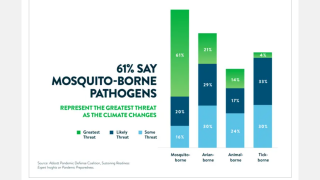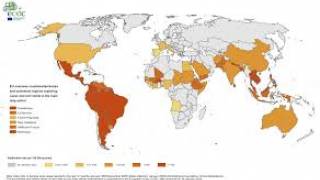France Confirms 3rd Local Zika Case

French authorities reported a third autochthonous case of the Zika virus in Hyères city, Var department, France.
This Zika case resides in the close vicinity of the first 2 cases and had no travel history to Zika-endemic countries, reported the European Centers for Disease Control and Prevention (ECDC) on October 31, 2019.
All 3 cases had an onset of Zika virus symptoms in early/mid-August 2019, and all have recovered.
This new case reinforces the hypothesis of the autochthonous vector-borne transmission of Zika in the Hyères city vicinity during August 2019. As the cases had an onset of symptoms only a few days apart, it is likely that they belong to the same transmission cycle.
To ECDC’s knowledge, this event was the first report of vector-borne transmission of Zika virus disease by Aedes albopictus mosquitoes in Europe. As temperatures are progressively decreasing during autumn, the environmental conditions are currently not favorable for sustained mosquito transmission.
Additionally, French health authorities have reinforced their epidemiological surveillance to identify other possible Zika cases, reported the ECDC.
To date, the overall conclusions of the Zika rapid risk assessment issued by ECDC on October 16th remain unchanged, saying ‘the risk for the population, including pregnant women and their unborn children, is low.’
Furthermore, ‘there is a very low likelihood that travelers to this area will become infected, introduce the virus, and initiate further local transmission in their EU/EEA country of residence.’
French healthcare providers, such as general practitioners, midwives and gynecologists/obstetricians working in the Hyères area in southern France were alerted about the event, and instructions were provided for the management of pregnant patients that live in or visited, the affected area between July and September 2019.
Previously, there were 6 Zika virus cases related to international travelers confirmed by the ECDC in France during 2019.
A communication campaign was launched to inform citizens about personal protective measures and the destruction of larval sites.
The Zika virus disease (ZIKV) has been reported to cause fetal abnormalities, such as microcephaly and Guillain-Barre syndrome. While Zika is known to be primarily transmitted through mosquito bites, various studies have shown that it can also be sexually transmitted.
For these reasons, ZIKV was recognized in 2016 as a Public Health Emergency of International Concern by the World Health Organization (WHO).
One of the Zika prevention methods focused on by the WHO is the use of condoms.
But, a recent study found less than 25 percent of 2,364 women surveyed in Puerto Rico reported consistent condom use during pregnancy in 2016.
To alert people of their Zika risks while traveling to Zika endemic countries, the US Centers for Disease Control and Prevention (CDC) released guidance in 2016 for the prevention of sexual transmission of Zika virus for pregnant women and couples planning to conceive.
Both the CDC and WHO advise pregnant women, and those planning to conceive a child, refrain from visiting Zika-endemic countries, such as Cuba and Haiti.
Recent Zika virus news
- Zika Infection Reduced Infant Receptive-Language Skills
- 2nd Locally-Acquired Zika Case Confirmed in Southern France
- A Small Molecule May Block Zika Virus Infections
The first cases of locally transmitted Zika in the USA were identified in Florida in July 2016. During 2019, the State of Florida has reported 36 travel-related Zika cases and is monitoring 23 pregnant women with Zika, as of October 19, 2019.
Zika virus news is published by Zika News.
Our Trust Standards: Medical Advisory Committee

























